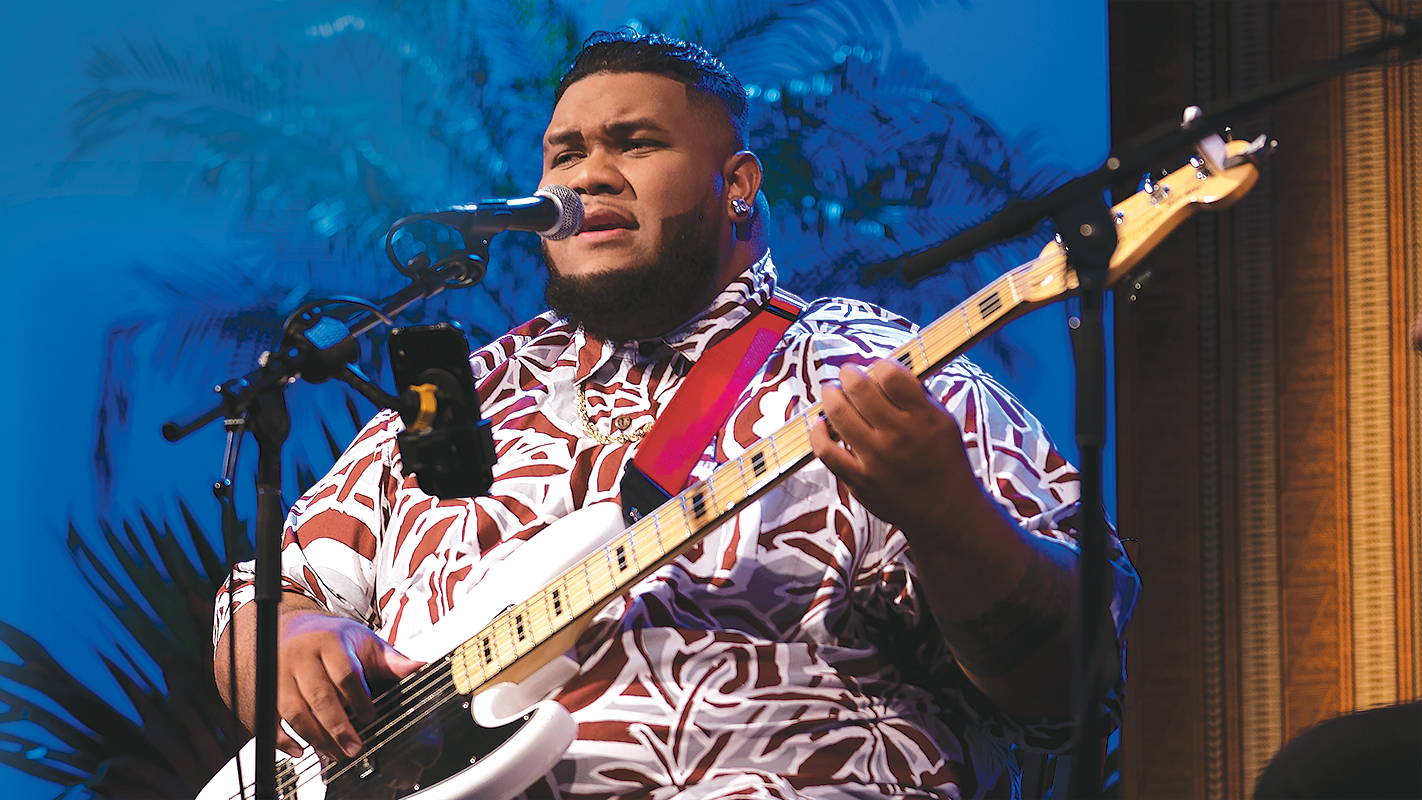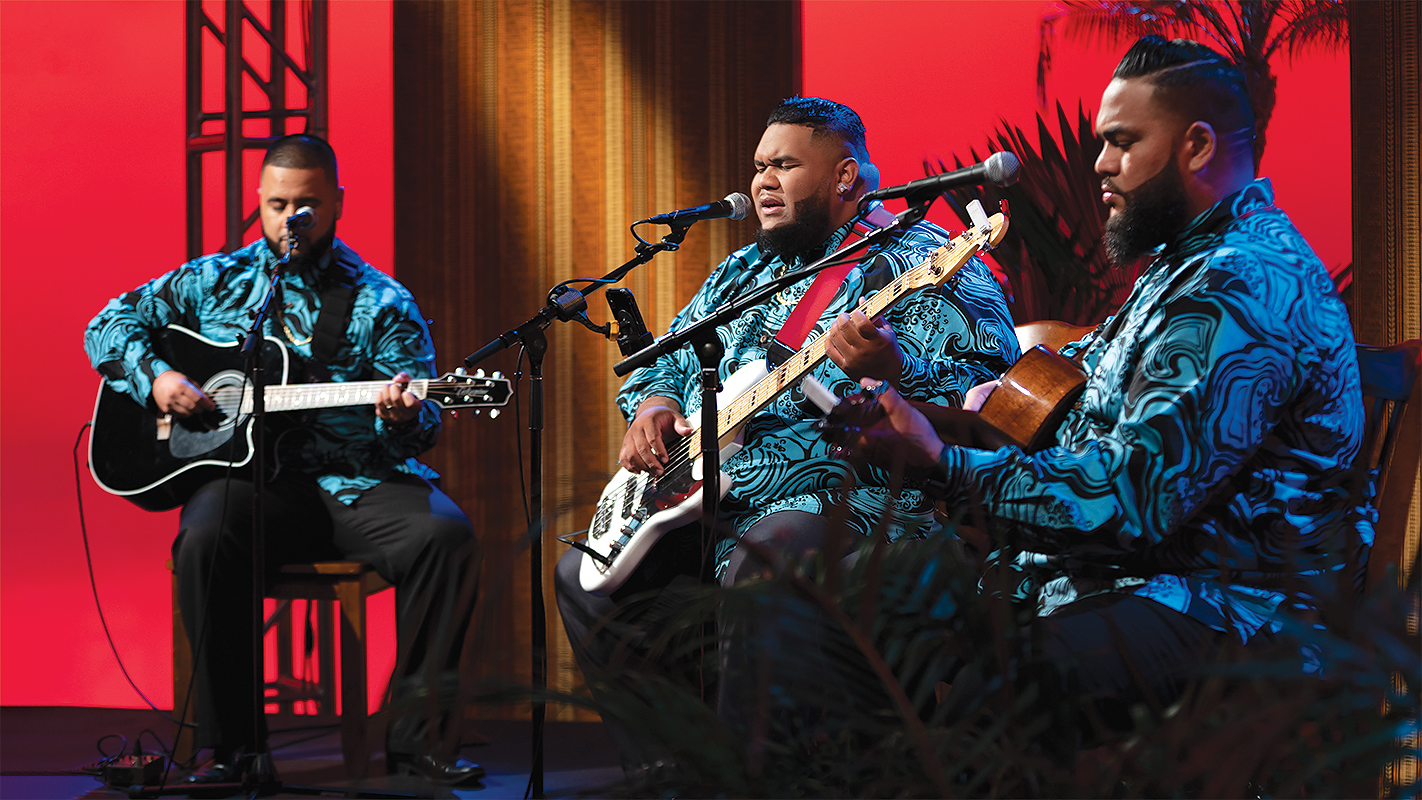The PBS Hawaiʻi Livestream is now available!
PBS Hawaiʻi Live TV
June Cover Story by Liberty Peralta , PBS Hawai‘i
As a young child, Josh Tatofi thought he had an ordinary life.
“I thought everyone’s dad was a rock star, and I thought everyone was playing music,” he says. His father, Tivaini Tatofi, was a founding member of local island music group Kapena. “I didn’t really know that my childhood was special until way later,” says the younger Tatofi.
Likewise, he didn’t find music particularly special right away. He was about six years old when his dad would start showing him basic notes on the bass guitar. He’d also go through the motions of taking guitar and piano lessons. “I was so over it,” he says of the latter. “I wanted to play with the kids next door.”
That feeling changed a few years later – “when I was eight or nine” – when he and fellow children of Kapena’s band members were “thrown onstage to play a couple of songs,” recalls Tatofi. “I liked the feeling of being onstage, playing music. I wanted to be like my dad.”
He’d find further inspiration from R&B vocalists like Luther Vandross and Pebo Bryson. “Love songs, ballads is what I love to sing,” says Tatofi.
Born in Honolulu, Tatofi grew up on Windward O‘ahu, in Kāne‘ohe, before moving with his family to Maui in his early teens. It was in Kāne‘ohe that Tatofi would have a breakthrough moment, when his friends of the Hawaiian music group Hū‘ewa invited him onstage at a bar to sing a Hawaiian-language song.
“I came off stage, and I didn’t know, but Kumu Hula Auntie Aloha Dalire was in the crowd,” Tatofi says. “She tells me: ‘Eh, I don’t know what you’re doing with your music career life, but I think you should sing Hawaiian music.’ And I was like: ‘Oh, no, no, no, no, no. Thank you, Auntie, but no, I just don’t think that’s the right thing to do.’”
Dalire passed away a week or two later.
“I remember singing at her funeral, and I remembered the conversation that we had, and it just lingered upon me for a while,” Tatofi says.
His desire to stay in the Islands and entertain local audiences, encouragement from friends, and a growing ease and excitement in creating Hawaiian music arrangements, steered him toward writing more Hawaiian mele.
Tatofi admits he doesn’t speak the Hawaiian language, so he writes his music in Tongan, his family’s native language, then in English, before enlisting the help of friends fluent in Hawaiian to translate.
“When you try to write it in English [first], and then translate it to Hawaiian, it’s kind of difficult just saying ‘I miss you,’” he says. “In order to get the proper ‘I miss you’ in Hawaiian, I have to write it in Tongan first, ‘cause once I translate it from Tongan, it turns into something like, ‘The morning mist lingers throughout my day.’ That part just kind of kills me, because it picks at your brain and your heart at the same time.”

Josh Tatofi (center) with bandmates Travis Kaka (left) and Laupepa Letuli (right)
Tatofi wrote his first Hawaiian language song, “Pua Kiele” – “not knowing once we released that song, that it would change my life forever,” says Tatofi. His 2016 debut album, also called Pua Kiele, would go on to win two Nā Hōkū Hanohano awards.
He hasn’t let success get to his head. “I’m still a student of being a practitioner of Hawaiian music, of Hawaiian culture,” he says. “I’m still very much learning.”
Josh Tatofi is featured on a new episode of PBS Hawai‘i’s Nā Mele: Traditions in Hawaiian Song. He’s joined by bandmates Travis Kaka on rhythm guitar and backing vocals, and Laupepa Letuli on lead guitar and backing vocals. The program also features hula dancers from three different hālau: Hula Hālau ‘O Kamuela, Hālau Hi‘iakaināmakalehua and Hālau Ka Liko Pua O Kalaniākea. Watch this performance online here on PBS Hawai‘i.
